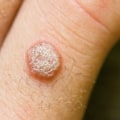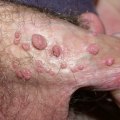Genital warts can be an uncomfortable and embarrassing condition, but it's important to understand what they feel like and how to protect yourself. The surface of genital warts may feel bumpy or rough when touched, and they are often described as having a “cauliflower look”, appearing as a single bump or in small groups. Genital warts can also be itchy or even bleed. They look like whitish or skin-colored bumps that appear on the vulva, vagina, cervix, penis, scrotum, or anus.
They may be big or small and usually don't hurt. It's possible to get genital warts even if you use condoms or don't have penetrative sex, since a condom doesn't cover all of your genital skin. You can get warts even if you have had sexual contact with someone who has genital warts for several weeks, months, or even years after. If you think you may have genital warts, you should schedule an appointment with your GP or contact local sexual health services.
In men, symptoms of genital warts caused by HPV include small bumps or groups of bumps on the tip or shaft of the penis, scrotum, or anus. If you have warts or red bumps on or around your genitals, if your partner has HPV or another STD, or your partner has genital warts, see your doctor or nurse or contact your local Planned Parenthood health center. It may not be possible to find out who had the genital warts from or how long they had the infection. If you have genital warts, your current sexual partners should be tested because they may have warts and not know it.
Genital warts are a common sexually transmitted infection caused by a virus called human papillomavirus (HPV). A vaccine is available to prevent types of HPV infections that pose a high risk of genital warts and cervical cancer. Using a condom every time you have vaginal, anal, or oral sex is the best way to avoid spreading genital warts to your partner. The HPV vaccine offered to girls and boys aged 12 to 13 in England protects against cervical cancer and genital warts.
It is important to understand the symptoms of genital warts so that you can take steps to protect yourself.










